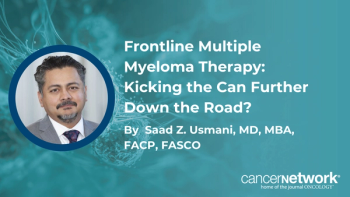
Oncology NEWS International
- Oncology NEWS International Vol 11 No 10
- Volume 11
- Issue 10
Pediatric Brain Tumors Up Risk of Endocrine Disorders
NIAGARA-ON-THE-LAKE, Ontario, Canada-Survivors of childhood brain tumors appear to have a high risk for non-neurological late effects such as endocrine disorders, according to a report (abstract 7) presented at the 7th International Conference for Long-Term Complications of Treatment of Children and Adolescents for Cancer, hosted by Roswell Park Cancer Institute.
NIAGARA-ON-THE-LAKE, Ontario, CanadaSurvivors of childhood brain tumors appear to have a high risk for non-neurological late effects such as endocrine disorders, according to a report (abstract 7) presented at the 7th International Conference for Long-Term Complications of Treatment of Children and Adolescents for Cancer, hosted by Roswell Park Cancer Institute.
This increased risk was found in survivors no matter what their treatment, although the risks were higher in patients who received both radiation therapy and chemotherapy.
"We looked at problems that manifested themselves 5 years postdiagnosis," said Leslie Robison, PhD, director, Division of Pediatric Epidemiology and Clinical Research, University of Minnesota. "This project is an overall first pass at looking at these outcomes after brain tumor treatment. We are continuing to follow this group."
This study compared 1,607 brain tumor survivors who participated in the Childhood Cancer Survivor Study with 3,418 cancer-free siblings.
The brain tumor survivors reported substantially higher rates than siblings of hypothyroidism [relative risk (RR) 14.3], growth hormone deficiency (RR 278), medications needed to reach puberty (RR 86), stroke (RR 42.8), and osteoporosis (RR 24.7). Rates of diabetes mellitus were similar between the groups.
The cohort received the following treatments26% surgery alone, 42% surgery and radiation therapy, 28% surgery, radiation therapy, and chemotherapy, and 4% radiation therapy or chemotherapy or both.
Among the survivors, after controlling for histology, sex, and age at diagnosis, radiation therapy increased the risk of a non-neurological outcome, compared with surgery alone. Risks were even greater for those survivors who also received chemotherapy.
"We found that the combination of radiation therapy and chemotherapy creates a greater risk for these problems than radiation alone," Dr. Robison said. "We do not know if this is a true effect or an artifact. We hope that follow-up of this cohort and additional survivors will help us answer this question."
Dr. Robison stressed that physicians who care for this patient population should be aware of these risks and encourage appropriate monitoring and follow-up care.
Articles in this issue
over 23 years ago
FDG-PET Predicts Prognosis in Primary Osteosarcomaover 23 years ago
Vaccine Turns Immune System Against Cancer Cellsover 23 years ago
Three Themes to Guide von Eschenbach at NCIover 23 years ago
Long-Term Exposure to Diesel Exhaust Poses Lung Cancer Riskover 23 years ago
Three Themes to Guide von Eschenbach as NCI Directorover 23 years ago
Gleevec Gets FDA Priority Review for First-Line Use in Early CMLover 23 years ago
New Anti-HIV Agent Prevents Virus From Entering Cellover 23 years ago
Docetaxel/Gemcitabine Effective in Advanced NSCLCNewsletter
Stay up to date on recent advances in the multidisciplinary approach to cancer.






































